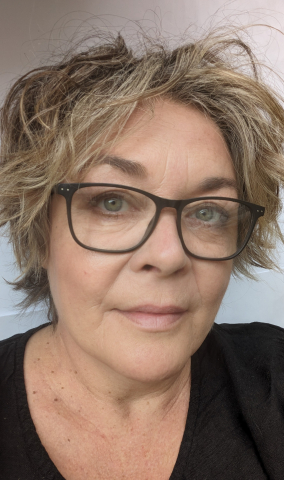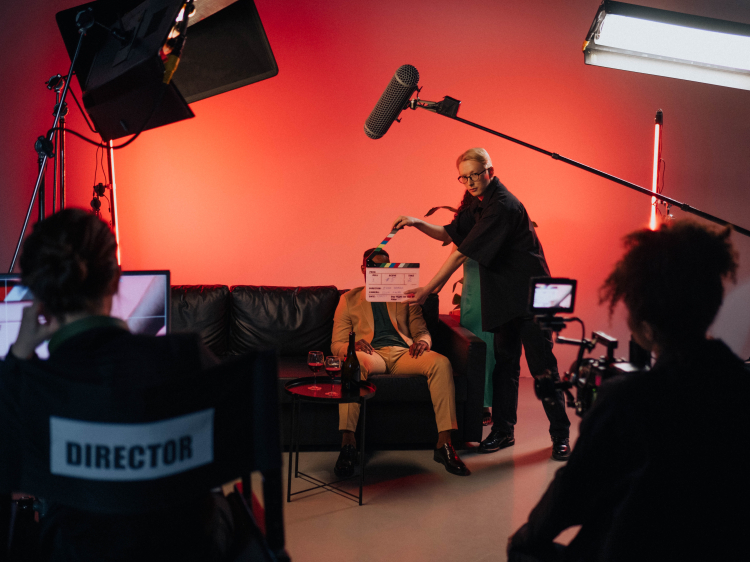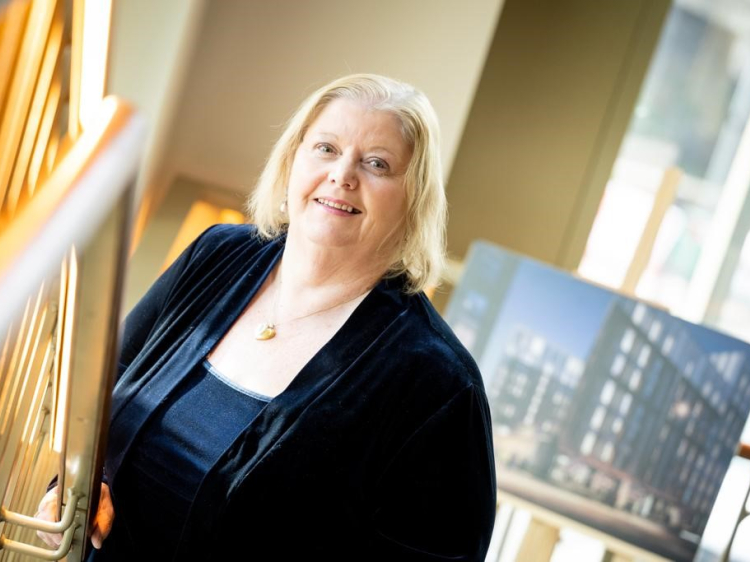Sam Beckinsale’s story dispels many of the myths surrounding domestic abuse, including the fact that there has to be physical violence for abuse to occur. It underscores the reality that anyone can be a victim, just as anyone can be a perpetrator. For employers, it also demonstrates the need to learn about the scope of domestic abuse and to think about the language used around domestic abuse, as victims may struggle to understand what is happening to them.
Before Sam Beckinsale met her abuser, things were going great. She enjoyed a successful acting career, had financial stability, was fiercely independent, and led a fulfilling, sociable life.
Then she met her perpetrator, and things began to change. “He was utterly charming, funny, and interesting. We came from very different worlds. Things happened very quickly. We moved in together. I sold my house and bought another house away from my family and friends, because he wasn’t in a position to move for work,” she says.
Sam was physically strong. She played firefighter Kate Stevens in the hit TV show, London’s Burning. Because her abuser was not a physical threat to her, she let her guard down. “I’m tall and strong and the roles I tended to play weren’t wallflowers. His particular physicality meant that there wasn’t even a possibility of a physical threat. That was the one thing that caught me out, because I still believed the myth that domestic abuse had to mean physical violence,” she explains.
In fact, Sam had always told herself that she would walk out of any relationship where a partner raised a hand to her. She didn’t see herself as vulnerable, and neither did her friends or family. Even though they didn’t like her abuser, they assumed that she knew what she was doing, because the Sam they knew would not put up with abuse from anyone.
Dispelling the Myths
Those assumptions meant that Sam, and those around her, didn’t understand the jeopardy she was in. It started with the small things. Her perpetrator didn’t like the way she sliced bread and would get angry and punish her over it. He claimed he couldn’t stand the taste or smell of coffee, despite having offered her a coffee liquor on their first date. As a result, she gave up coffee to keep him happy.
Similarly, her abuser used to bring her flowers every Friday evening from the train station on his way home from work, and when she once told him she appreciated it but didn’t want him to feel it was necessary, he suddenly became ‘allergic’ to flowers. Now, nobody could bring Sam flowers, even though she adored them, because he couldn’t have them in the house. Over time, her abuser complained about her moving around too much in her sleep, or giving off too much heat in the bed, even if she changed their sheets or the temperature in the room or tried in many ways to make him more comfortable. Always a good sleeper, Sam became extremely anxious about sleeping.
Years of psychological, emotional, economic abuse and controlling and coercive behaviour took its toll on Sam. She was physically and emotionally depleted, had lost all control over her house and finances, could no longer sleep, and was resigned to her own death. Her perpetrator had never hit her, but he had managed to destroy her life.
“I knew what was happening to me was vicious and wrong, but I didn’t have a name for it. I didn’t have a framework for it. I was with someone who punished me for not cutting a slice of bread properly, who took my money, isolated me from family and friends, stopped me from working, deprived me of sleep and food. I had to pander to him and massage his ego daily. The psychological stress of being with him was unbearable,” she says.
Still, Sam didn’t have the language to really understand what was happening to her. “When you’re in the eye of the storm it’s hard to see the bigger picture, even for outsiders. It’s only when you step back that you can join the dots.”
Leaving the Relationship
Sam left her perpetrator once, but he followed her, and she returned. She stayed because she thought she was protecting another family member by doing so. It was only over time that she understood that her actions were having the opposite effect. “I can remember the moment as clear as a bell. I was stood in the kitchen, and the realisation was that nothing good would ever come out of this situation. It was never going to change, and anyone in his proximity would be damaged and probably lose their lives. It wasn’t that I wanted to kill myself at all, but at that point, it was about giving him what he wanted, and he was very clear with both his actions and his words that what he wanted was my death. It was about giving up.”
But instead of giving up, Sam left the relationship, albeit with no money and without her previous network of support. She was physically ill. She turned to her local domestic abuse organisation, which helped her understand what she had been through.
“They helped me see that what happened had nothing to do with me. He had done it before, and he would do it again. My biggest moment was when the penny dropped and I realised there was a pattern and predictability to it. I realised I would never be the same. I went through a period where I didn’t want to connect with anyone, even friends. I didn’t want the vulnerability of it, to have to completely change my personality in order to survive. I came to realise that there had always been red flags, and while I challenged them, I didn’t take them to be the serious life-threatening signals that they were, because like all of us, I didn’t have a name for it. Until 2015 there was no recognition of coercive and controlling behaviour,” she explains.
Making the Film “Love?”
Sam began to pick up the pieces, and over time, she began to speak out. In 2022, she wrote and helped create the docudrama “Love?”, bringing together the lived experiences of many victims in order to raise awareness and depict coercive and controlling behaviour. The film brought together director and editor Jason Figgis and producers Simon W Golding and John West, as well as composer Scott Buckley. It highlighted the fact that domestic abuse can happen to anyone, at any place and time, and equally, can be perpetrated by anyone. Nonetheless, it has common patterns and repeated tactics across the globe.
“Abuse is so patterned that the police call in extra officers around football matches and Christmas and Halloween, because they know that abuse is going to spike. It’s so predictable on a mass scale. If it’s predictable, it follows naturally that it should be preventable. My personal view is that the more we can educate people about the fact that there are people who abuse, who use similar tactics and methodologies, the more we can bring about change,” says Sam.
In fact, “Love?” has already changed minds. One woman who watched it, was frustrated that her daughter was not leaving her abusive partner, decided to set up an escape plan for her and her children. She spoke to her daughter’s place of work, which then got involved, and arranged a safehouse.
“And I got a message not that long ago that they were out and safe. It makes me quite emotional to think that we may have played some part in that. It just demonstrates what we can achieve and how we can contain abusers. But you can only do that if you know what you’re dealing with, and I certainly didn’t know what I was dealing with,” she says.
Lessons for Employers
Sam wants employers to understand that domestic abuse does not always mean direct physical violence, that it can impact physical and emotional health as well as economic safety and that anyone can be at risk. “The idea that it only happens on a council estate on a Friday night with some bloke with a can of lager in his hand is absolutely not the case. Controlling and coercive behaviour is domestic abuse. It is insidious and may not be recognised as abuse, particularly by the victim, since over time the abusive behaviour becomes normalised. I’d like employers to think about their inhouse culture, to think about the fact that in some sectors, the behaviours they expect from employees in order to move up the promotion chain can actually encourage this type of behaviour. Our workplaces are our biggest secret weapon. They have immense power to change society. All workplaces should have a domestic abuse policy to support their employees who are impacted. Since one in four women and one in six-seven men experience domestic abuse, most organisations of any size will have employees who are themselves a victim of domestic abuse. But you can’t put a domestic abuse policy together if you don’t understand what domestic abuse is actually about. The more we talk about it and communicate about it, the more we stop being scared and ashamed of it, the more we’ll see change,” she says.







